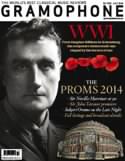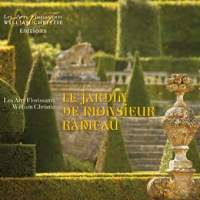Texte paru dans: / Appeared in:
*

GRAMOPHONE (07/2014)
Pour s'abonner /
Subscription information
Les Arts Florissants
AF002

Code-barres / Barcode : 3149028052824 (ID
425)
Consultez toutes les évaluations recensées pour ce cd
~~~~ Reach all the evaluations located for this CD
Reviewer:
Richard Lawrence
This
follows the pattern of Sabine Devieilhe’s recital ‘Le grand théâtre de l’amour’
(Erato, 2/14) by fashioning a sequence of airs and ensembles from various operas
into a story. But whereas Devieilhe’s anthology drew exclusively on operas by
Rameau, this new programme – devised by Paul Agnew, tenor and now Associate
Musical Director of Les Arts Florissants – comprises excerpts from works by
various composers ranging from Campra (1697) to Dauvergne (1768).
The title reflects
‘Le jardin des voix’, the biennial training programme for young singers that
William Christie founded in 2003 (the group recorded here made up the class of
2013). The links between the numbers are less tenuous than on the Devieilhe
recording: Iole’s air from Hercule mourant (1761) leads pleasingly into
Aricie’s from Rameau’s first opera (1733), both of them softened by flutes;
drunken Zerbin in La Vénitienne (1768) is followed by scenes from
L’ivrogne corrigé (1760). But what are perhaps more interesting than the
storyline are the links between the composers, with Rameau as the hub: according
to Christie, he heard Montéclair’s Jephté shortly before composing
Hippolyte et Aricie; Dauvergne was one of his pupils. Gluck composed his
opéras comiques for Vienna rather than Paris but he studied the operas of Rameau
before writing his later tragédies lyriques. William Christie and his orchestra
are as wonderful as ever; his predilection for extra effects, including a noisy
tambourine in L’ivrogne corrigé, extends to a wind machine in Les
fêtes d’Hébé. The singers have been very well coached and make a good
ensemble. Zachary Wilder, effortful in ‘Hâtons-nous’ from Dardanus,
serves as a reminder of how accomplished tenors such as Paul Agnew really are in
haute-contre roles. Cyril Costanzo has a good, firm bass but it sounds as though
the beautiful sleep scene in La Vénitienne is too high for him. Victor
Sicard, a graduate of the National Opera Studio in London, delivers ‘Monstre
affreux’ to the manner born. The three women are uniformly excellent. Benedetta
Mazzucato, more of a mezzo than a true contralto, is stylish and touching in
Doris’s plaint from L’Europe galante. The packaging includes texts and
translations, good articles, a discography and a specially commissioned short
story. Monsieur Rameau’s garden is a delight.
Cliquez l'un ou l'autre
bouton pour découvrir bien d'autres critiques de CD
Click either button for many other reviews


